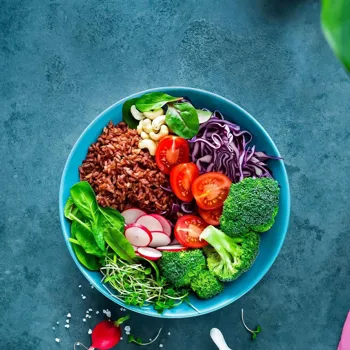Discover 10 Tips for a Healthy Relationship with Food: Nourish Your Body, Mind, and Soul! Dive in for mindful eating wisdom
Namaste, readers! How's your relationship with food going? Is it a harmonious
friendship, or more of a complicated, on-again-off-again affair?
In today's fast-paced world of fad diets and Instagram-worthy dishes, it's easy to lose track of what truly matters: nurturing a healthy and balanced connection with the food you eat.
Forget restrictive rules and guilt-ridden eating; let's explore ten simple yet powerful tips to help you build a positive and sustainable relationship with food, one delicious bite at a time. After all, food is meant to be enjoyed, not feared!
Listen to Your Body's Wisdom: The Hunger-Fullness Cues
Our bodies are incredibly intelligent machines, and they constantly communicate their needs. Just like you know when you need to sleep or drink water, your body also tells you when it's hungry and when it's full. The key is to tune in and listen!
Before you reach for a snack or a meal, pause and ask yourself, "Am I truly hungry?" Sometimes, we eat out of boredom, stress, or emotional triggers, rather than genuine physical hunger. Learning to differentiate between these urges is crucial.
When you do eat, pay attention to your fullness signals. Slow down, savor each bite, and notice when you start feeling satisfied, not stuffed. This simple practice can prevent overeating and promote a more mindful approach to food.
Remember, it's about respecting your body's innate wisdom, not following external rules or arbitrary portion sizes.
Ditch the Diet Mentality: Embrace Food Freedom
Diets are often restrictive, unsustainable, and can lead to a negative relationship with food. They create a sense of "good" and "bad" foods, fostering guilt and anxiety around eating. Instead of focusing on what you "can't" have, shift your mindset to what you "can" include in your diet.
Think of adding nutritious and delicious foods that nourish your body and bring you joy. Embrace a variety of fruits, vegetables, whole grains, and lean protein sources. Allow yourself treats and indulgences in moderation, without feeling guilty or ashamed.
Remember, food is not your enemy; it's fuel for your body and a source of pleasure. By ditching the rigid rules of dieting, you can cultivate a more relaxed and enjoyable approach to eating.
Practice Mindful Eating: Savor the Moment
In our busy lives, we often eat on autopilot, rushing through meals without truly appreciating the experience. Mindful eating is the opposite of that; it's about being fully present and engaged with your food. Before you start eating, take a moment to observe your food.
Notice the colors, textures, and aromas. Take a deep breath and appreciate the effort that went into creating this meal. As you eat, chew slowly and deliberately, paying attention to the flavors and sensations. Put down your fork between bites and savor each mouthful.
Avoid distractions like your phone or television, as these can prevent you from fully focusing on your food. Mindful eating helps you connect with your food on a deeper level, enhances your enjoyment, and promotes better digestion.
Cook at Home More Often: Connect with Your Food Source
Eating out is convenient, but it can also disconnect you from the food you're consuming. Cooking at home allows you to control the ingredients, portion sizes, and cooking methods. It's also a great way to connect with your food source and appreciate the process of creating a meal.

Start by learning a few basic recipes and gradually expand your repertoire. Experiment with different flavors and ingredients, and don't be afraid to make mistakes. Cooking can be a therapeutic and enjoyable experience, and it's a great way to nourish your body and soul.
Plus, home-cooked meals are often healthier and more affordable than restaurant food. So, ditch the takeout menu and embrace the joy of cooking!
Nourish Your Body, Not Just Fill It: Focus on Nutrients
While it's important to enjoy your food, it's also crucial to prioritize nutrient-dense options. Focus on incorporating a variety of fruits, vegetables, whole grains, and lean protein sources into your diet. These foods provide the vitamins, minerals, and antioxidants your body needs to thrive.
Don't just focus on calories; think about the nutritional value of the food you're eating. Choose whole, unprocessed foods over refined and processed options whenever possible. Read food labels carefully and be mindful of added sugars, unhealthy fats, and sodium.
By prioritizing nutrient-rich foods, you'll not only feel better physically but also develop a healthier relationship with food.
Challenge Food Rules: Break Free from Restrictions
Many of us have internalized food rules, often based on outdated or inaccurate information. These rules can create anxiety and guilt around eating, and they can prevent us from enjoying food. Challenge these rules and question their validity.
Are they based on scientific evidence or personal beliefs? Are they serving you or holding you back? For example, if you believe that carbohydrates are "bad," consider the fact that whole grains are a valuable source of energy and fiber.
If you think you shouldn't eat after a certain time, ask yourself if that rule is truly necessary or if it's just causing you unnecessary stress. By challenging food rules, you can break free from restrictions and develop a more flexible and balanced approach to eating.
Practice Self-Compassion: Be Kind to Yourself
Everyone makes mistakes, and it's okay to indulge in unhealthy foods occasionally. Don't beat yourself up or feel guilty when you slip up. Instead, practice self-compassion and remind yourself that you're human. Acknowledge your feelings, learn from your experiences, and move on.
Don't let one "bad" meal derail your progress. Remember that a healthy relationship with food is a journey, not a destination. There will be ups and downs along the way, but the key is to be kind to yourself and keep moving forward.
Seek Professional Guidance: When Needed
If you're struggling to build a healthy relationship with food, don't hesitate to seek professional guidance from a registered dietitian or therapist. They can provide personalized support and help you address underlying issues that may be contributing to your challenges.

They can also teach you coping mechanisms for dealing with emotional eating or body image concerns. Remember, seeking help is a sign of strength, not weakness.
Make Meal Times Enjoyable: Create a Positive Atmosphere
Food is meant to be enjoyed, so make meal times a positive and pleasant experience. Create a relaxing atmosphere by setting the table, lighting candles, and playing soothing music. Eat with friends or family whenever possible, and engage in enjoyable conversation.

Avoid eating in front of the television or while working, as these distractions can detract from the experience. By creating a positive atmosphere around meal times, you can enhance your enjoyment of food and foster a healthier relationship with it.
Celebrate Cultural Food Traditions: Embrace Diversity
Food is an integral part of culture, and celebrating cultural food traditions can be a wonderful way to connect with your heritage and explore new flavors. Don't be afraid to try new cuisines and experiment with different ingredients.
Learn about the history and significance of traditional dishes, and share them with your friends and family. By embracing cultural food traditions, you can broaden your horizons, expand your palate, and develop a deeper appreciation for the diversity of food.














